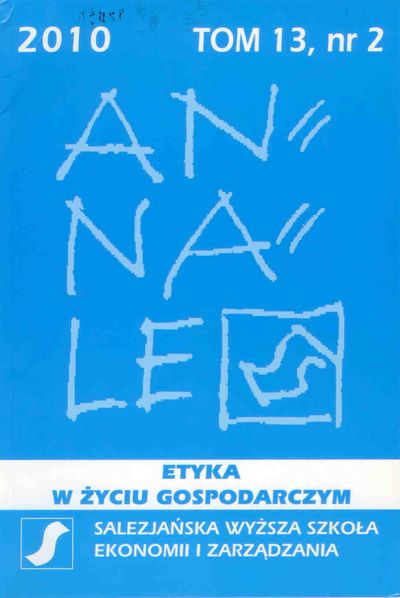Etyka – zagrożenie wolności nauki?
DOI:
https://doi.org/10.18778/1899-2226.13.2.02Słowa kluczowe:
liberty, science, ethics, human person, common goodAbstrakt
Paper has three parts. Te first part gives the reasons for need of liberty external-social of science guaranteed by law. Speaks about it Declaration of human rights in 1948 and social teaching of Church – including documents of Vaticanum II and Jean Paul II, which indicate of subjectivity and dignity of man as person. The second part of this paper based on personalism demonstrates that science can harmoniously develop only in the climate of internal-moral freedom of scientist. The purpose of science is revelation of truth, but effects of scientific investigations – in particular of biological-medical sciences – influence on the life of human individuals and societies. Conscious and free activity of man has ethical character, therefore liberty of science ought to be responsible liberty and then to be subordinated the ethical criterions. Science cannot ignore values and rules moral. The third part of paper stated that good of human person and common good of society demand juridical limitations of scientific inquiries’ liberty. Liberty is man’s right but also its obligation to respect of human person’s fundamental rights – including right to life, integrality and dignity. Therefore internal-ethical and external-juridical limitations are necessary of scientist’s liberty.Bibliografia
Gajewski W., P. Węglicki, Inżynieria genetyczna, PWN, Warszawa 1986.
Google Scholar
Jan Paweł II, Kościół jest solidarny z uniwersytetem. Do środowiska naukowego w Bolonii 18 IV 1982 [w:] Nauczanie społeczne 1982, t. I, Ośrodek Dokumentacji i Studiów Społecznych, Warszawa 1986.
Google Scholar
Jan Paweł II, Nauczanie społeczne. Trzecia pielgrzymka do Polski 8–14 czerwca 1987, Ośrodek Dokumentacji i Studiów Społecznych, Warszawa 1988.
Google Scholar
Jan Paweł II, Prawda decyduje o wolności nauki. Przemówienie na Uniwersytecie Fryburskim 13 VI 1984.
Google Scholar
Jan Paweł II, Przemówienie do środowiska KUL 9 VI 1987.
Google Scholar
Jan Paweł II, Wiara i kultura, Polski Instytut Kultury Chrześcijańskiej, Rzym 1986.
Google Scholar
Kant I., Uzasadnienie metafizyki moralności, PWN, Warszawa 1971.
Google Scholar
Kowalczyk S., Wolność naturą i prawem człowieka. Indywidualny i społeczny wymiar wolności, Wydawnictwo Diecezjalne, Sandomierz 2000.
Google Scholar
Maritain J., Humanizm integralny, Veritas, Londyn 1960.
Google Scholar
Meuers J., Freiheit und Wissenschaft [w:] Die Freiheit des Westens. Wesen, Wirklichkeit, Widerstände, hrsg. von O. B. Roegele, Verl. Styria, Graz–Wien–Köln 1967.
Google Scholar
Prawa człowieka. Wybór źródeł, oprac. K. Motyka, Ad Rem, Lublin 1996.
Google Scholar
Singer P., D. Wells, Dzieci z próbówki. Etyka i praktyka sztucznej prokreacji, Wiedza Powszechna, Warszawa 1988.
Google Scholar
Pobrania
Opublikowane
Jak cytować
Numer
Dział
Licencja

Utwór dostępny jest na licencji Creative Commons Uznanie autorstwa – Użycie niekomercyjne – Bez utworów zależnych 4.0 Międzynarodowe.









